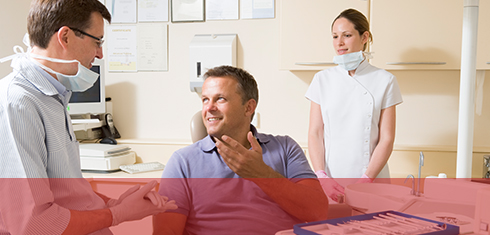Caring for your Child’s Teeth
Your teeth are precious. It’s never too early to start looking after them. By helping your child to look after their teeth you’re laying the foundations for a lifetime of healthy teeth and a happy smile.
Tiny teeth

Teeth start to form when babies are in the womb. Some babies are born with teeth, others don’t have any until they are a year old.
Your baby will show a variety of signs when their teeth are coming through. These include: flushed cheeks, dribbling, sore red gums, restlessness, irritability, disturbed sleeping and the desire to chew.
It’s a painful business and teething rings either chilled or water filled may help soothe the baby. If you have any concerns talk to your dentist at Redhouse, or your health visitor.
Most children don’t have a full set of teeth until they are around 3 year old. Permanent teeth start to come through at about 6 years of age. The first permanent molar (back) teeth come through behind all the baby teeth at the back of the mouth.
Permanent teeth sometimes come through slightly displaced or before the baby tooth is pushed out. Your dentist can advise on this at the next check-up.
Brushing
Start brushing your child’s teeth as soon as they appear. Use a soft, small headed toothbrush with fluoride toothpaste.

Toothpaste contains different amounts of fluoride. Fluoride protects teeth and fights decay. For children under 3 use a smear of 1,000 ppm (parts per million) fluoride toothpaste. You’ll find this information on the toothpaste box. Children aged 3 years and over should use a pea sized amount of 1,3501,500 ppm fluoride toothpaste on their brush.
Always help your child
Teeth should be brushed twice a day, including just before bedtime. This is important as it means the fluoride stays in the mouth for as long as possible to strengthen the teeth.
Children should be helped and supervised when they are brushing until they are at least 7 years old. When brushing they should not use water or a mouthwash and should spit the toothpaste out without rinsing. This keeps the toothpaste on the teeth.

Visiting the dentist
We’ve cared for some of our patients since their childhood. We’ve watched them grow up and many of them bring their own young ones now! We can begin seeing your child as soon as their first teeth come through. They probably won’t need treatment but it will get them familiar with Redhouse and the team. They are always welcome!
How to look after your mouth following an extraction
Your mouth is likely to feel sore for a little while after you’ve had a tooth, or teeth, taken out. This is normal and nothing to worry about. However we advise taking extra care of yourself, and your mouth for at least 24 hours after the extraction.
Take it easy
Don’t do any strenuous exercise or work.
Eat and drink carefully
Avoid hot food and drink until the anaesthetic wears off. It’s easy to scald yourself when your mouth is numb. Also take care not to chew your cheek. This is another common problem
when there is no feeling.
Don’t drink alcohol. This can encourage bleeding and delay your healing.
Don’t rinse
It’s tempting to rinse or gargle to clear out your mouth. But you need to allow the socket to heal and a blood clot to form. The clot acts like a lid by sealing the socket and keeping out infection. Keep your tongue away from the clot and avoid chewing on that side of your mouth.
Keep it clean
After 24 hours gently bathe the area with hot salty water (a teaspoon of salt in a glass of warm water) four times a day for at least three days or until the area has healed.
Eating healthily and taking vitamin C supplements will also help with healing.
If there is bleeding
A small amount of bleeding is natural. But if the clot is disturbed and the socket bleeds then don’t rinse. Place a clean piece of cloth, such as a cotton handkerchief, over the area and bite down firmly for at least 20 minutes. Replace with a clean piece of cloth as needed.
If the bleeding does not stop after two hours, or gets worse, call the Redhouse team.
If you have pain
The anaesthetic will wear off after around 2-3 hours, and you may have some pain. You can take your usual painkiller, at the recommended dosage but you should avoid aspirin as this
can cause bleeding.
Gently bathing the area, after 24 hours, may also help.
Getting in touch with us
We may have already made a follow up appointment for you. If you have still have severe pain after three days and you’ve followed this advice please get in touch with the practice.








